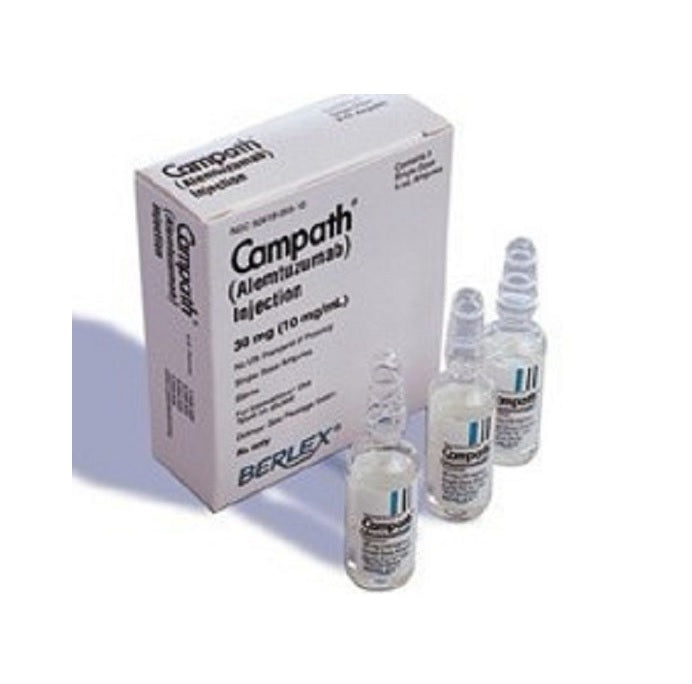Lemtrada (Alemtuzumab) Vial
Generic
Alemtuzumab (Generic Equivalent to Lemtrada)
Lemtrada Vial is used in the treatment of blood cancer (chronic lymphocytic leukemia) and multiple sclerosis (MS). It marks the cancer cells for destruction by the body’s immune system. It also modulates the immune system to limit its attacks on the nervous system.
Lemtrada Vial is given under the supervision of a doctor. Your doctor will decide what dose is necessary and how often you need to take it. This will depend on what you are being treated for and may change from time to time. You should take it exactly as your doctor has advised. Taking it in the wrong way or taking too much can cause very serious side effects. It may take several weeks or months for you to see or feel the benefits but do not stop taking it unless your doctor tells you to.
Rash, headache, and insomnia are some common side effects of this medicine. This medicine may reduce the number of blood cells (white blood cells) in your blood, thereby, increasing the susceptibility to infections or bleeding. Thus, inform your doctor immediately if you develop fever, chills, cough, mouth sores, or trouble breathing, and unusual bruising or bleeding, or blood in the urine. You will be checked regularly after giving the medication as it may cause fatal reactions such as chest pain, breathlessness, slow or irregular heartbeat.
Before taking it, tell your doctor if you have heart disease, liver, or kidney problems or are taking any medicines to treat infections. Many other medicines can affect, or be affected by, this medicine so let your healthcare team know all medications you are using. This medicine is not recommended during pregnancy or while breastfeeding. The use of effective contraception by both males and females during treatment is important to avoid pregnancy.
Uses Of Lemtrada Vial
Blood cancer (Chronic lymphocytic leukemia)
Multiple sclerosis (MS)
Benefits Of Lemtrada Vial
In Blood Cancer (Chronic Lymphocytic Leukemia)
Blood cancer, also called leukemia, is a cancer of the blood-forming tissues, that decreases the body’s ability to fight infection. Lemtrada Vial kills or stops the growth of cancer cells and also prevents the multiplication of cancer cells. It is an effective medicine but you should discuss the side effects and benefits of this medicine with your doctor. Let your doctor know if any of the side effects bothers you.
In Multiple Sclerosis (Ms)
Multiple sclerosis (MS) is a disease of the brain and spinal cord in which a person’s own immune system attacks the protective sheath (called myelin) of the nerves. This leads to symptoms such as vision loss, pain, fatigue and improper coordination. Lemtrada Vial helps to suppress the body’s immune system, thereby reducing the progression of the disease. It reduces the inflammation of the damaged nerves, prevents further damage and stabilises your immune system. It improves muscle strength and helps the patients to walk better. This makes the patients more confident and enhances their quality of life.
Side Effects Of Lemtrada Vial
Most side effects do not require any medical attention and disappear as your body adjusts to the medicine. Consult your doctor if they persist or if you’re worried about them.
Common Side Effects Of Lemtrada
- Rash
- Headache
- Insomnia (difficulty in sleeping)
- Nausea
- Upper respiratory tract infection
- Decreased white blood cell count
- Fatigue
- Fever
- Itching
- Flushing (sense of warmth in the face, ears, neck and trunk)
- Hives
- Decreased white blood cell count (lymphocytes)
How To Use Lemtrada Vial
Your doctor or nurse will give you this medicine. Kindly do not self administer.
How Lemtrada Vial Works
Lemtrada Vial is a monoclonal antibody. It flags the cancer cells for destruction by the body’s immune system. It also modulates the immune system to limit its attacks on the nervous system.
| Disclaimer :
The information provided on the website is intended to facilitate awareness about healthcare products and medical conditions generally but it is not a substitute for professional medical attention or advice. You should always speak with a qualified healthcare practitioner before taking any prescription or non-prescription drug. |

